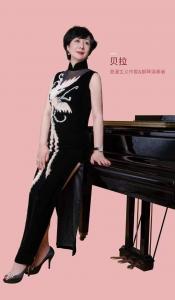ARTICLE AD BOX
CHINA, January 7, 2024 /EINPresswire.com/ — Bei La is an old friend of Japan Finance Weekly. We are drawn to her not only because of her rich experiences during her youth in Japan but also due to the powerful spiritual force emanating from her. She seems forever frozen in the bloom of her twenties, carrying dreams and pursuing romantic literature and art, with her core spirit deeply infused with humanism.
Her concert at the Shanghai Music Hall was fully crowded, with Mr. Zhao Qizheng, former Vice Mayor of Shanghai and former Director of the State Council Information Office of the People’s Republic of China, giving a speech. The event also attracted the presence of consuls and diplomats from over a dozen Euro-American countries stationed in Shanghai. The presence of consuls general from the United States, Russia, Canada, Israel, Japan, and other countries turned the Shanghai Music Hall into a small ‘United Nations’ for a brief moment. Such a situation is extremely rare in personal concerts and is considered an honor for the organizer. The British playwright Sir Ronald Harwood, who won the Oscar for Best Adapted Screenplay for the film The Pianist, adapted Bei La’s novel The Cursed Piano into the screenplay Pianist 2. Sir Harwood passed away during the COVID-19 pandemic, and Pianist 2 thus became his final work in his lifetime. Hollywood producer Mike Medavoy, an eight-time Oscar winner for Best Picture, invited her to write a novel titled Song of Survivors, inspired by his parents’ experiences in Shanghai in the 1930s and 1940s. American Jewish sinologist Howard Goldblatt, known for translating works by Mo Yan, has continuously translated Bei La’s works into English. Robert Kuhn, an American banker and president of the Kuhn Foundation, endorsed her novel The Cursed Piano. In November of this year, the renowned French playwright Maurici Macian Colet announced in Shanghai, China, that he has completed a French opera script titled Lover of Shanghai. The opera, composed by Quentin Lafarge, is scheduled to embark on a global tour starting in 2024, with its premiere taking place in Paris. The opera is adapted from Bei La’s Song of Survivors.
Michiko Kurose: Hello, Bei La! Glad to have you for our New Year interview. Where will you be spending New Year?
Bei La: Hello, Michiko! I’m celebrating the New Year in Los Angeles. The winter here is as warm as spring, and I really enjoy it. In early January, I’ll be meeting Mike Medavoy to discuss our plans in the new year. We were all born in Shanghai, and our friendship is like a family member. I would like to send him my best wishes.
Michiko Kurose: Compared to many Chinese and ethnic Chinese writers, you have strong international resources. How did you manage to achieve this?
Bei La: Thanks to Mr. Zhao Qizheng’s early recommendation, but the direct reason is that my works are filled with universal human emotions and destinies.
Michiko Kurose: The French opera Lover of Shanghai has received widespread attention from mainstream media in Europe, America, and Japan. What message do you want to convey?
Bei La: I hope that the French opera Lover of Shanghai can help emphasize human commonality in these turbulent times. Music and literature are universal languages, and through storytelling, people can become more humane, friendly, and kind. Undoubtedly, Lover of Shanghai will contribute to realizing this vision.
Michiko Kurose: Are all your works “cross-cultural love stories”?
Bei La: Yes, indeed. They are all cross-cultural, cross-ethnic, and cross-regional love stories. All the joys and sorrows express a certain force, communicating with god through stories.
Michiko Kurose: I saw in the news that this work, jointly performed by you, a Chinese-Canadian writer and a French playwright and composer, portraying the great love of the city of Shanghai, is considered a symbol of the power of cultural exchange between China and the West, especially at a time when tensions persist in the Israeli-Palestinian conflict and China-U.S. relations. On one side, there’s the melody of Lover of Shanghai, and on the other, the sound of gunfire continues.
Bei La: Things in the world change rapidly, and every leaf and cloud in the long river of history, whether beautiful or not, right or wrong, will have annotations as time passes. I aspire to be a messenger of love, peace, and friendship. This is not a profession but my faith in literature and music.
Michiko Kurose: Where did your literary enlightenment come from?
Bei La: My childhood was mostly spent with my grandparents. My grandfather had founded the largest private school in the local area (Ningbo), and he was highly cultured, speaking English without an accent. His influence on me came not from the stories he told me directly but from hearing stories about him from relatives and friends throughout my life. That is an unforgettable story, “one evening, as my grandfather returned from a relative’s house, he discovered that our home had been robbed. All the grain had been stolen, even the cotton jackets and quilts from the beds were taken. Fortunately, the reserve grain hidden in a secret room and the rice cakes in the water jar were not found. Just as my grandfather was closing the door, he noticed several raggedly dressed young boys preparing to board a small sailboat by the river, carrying whatever they could. He quickly shouted, ‘Children, children, I still have food here—fresh rice and rice cakes. Come, I’ll bring them to you.’ This voice echoed through the dusk, sounding like a god from the heavens. The youths stopped in their tracks, frozen in place…” Later, I heard that one of those young boys went abroad and became a highly influential pastor… I’ve asked my grandfather more than once why he treated those youths kindly. He never answered me. As I grew older, I found the answer. If food can redeem lost lambs, what greater gift is there? This is the enlightenment of literary faith, and it came from secretly peeking at my father’s several boxes of world literary masterpieces. In the late 1970s, as a child of around ten, I hid under the mosquito net on my bed, reading one “banned book” after another—Les Misérables, The Red and the Black, Madame Bovary… This eventually led to criticism from the class teacher and being punished with suspended classes. After moving to Tokyo, I became passionately obsessed with Yasunari Kawabata. Snow Country and The Dancing Girl of Izu became my youthful fantasies of the world of love.
Michiko Kurose: Your works are all cross-cultural love stories set in your hometown Shanghai. As the New Year approaches, do you have any thoughts or wishes regarding your hometown and literary creation?
Bei La: Due to my personal reasons, I returned to Canada in July 2022, and Shanghai has become the hometown I look back to from a distance. I hope that one day, Shanghai, my hometown, will be admired not only for its vibrant prosperity but also as a city that is more free, open, romantically intriguing, and intellectually wise. It should embody a historical temperament capable of embracing diverse cultures, once again attracting people from various ethnicities and beliefs worldwide to converge. I dream of a day when the banks of the Huangpu River resonate with the voices of romantic poetry, philosophy, and art, and when the bells of the Bund ring, everyone carries a sense of gratitude and prayer…
I marvel at the beauty of the imagined homeland! As for myself, I’ll continue to express the meaning of my existence through novels that depict cross-ethnic, cross-cultural love stories. Life is like an ever-flowing river, and only love and faith are the unextinguished torches that blaze, illuminating the path of humanity forward.
Michiko Kurose: Alright, finally, I chose one of your poems to dedicate to our readers. Also, wish you a Happy New Year! I hope you will publish more influential works in the future.
Bei La: Thanks a lot! Wishing all the readers of Japan Finance Weekly a joyous New Year!
When fate kisses me with hardship
Bei La
When fate kisses me with hardship
My tear-streaked face and aching heart will still see beautiful flowers blooming.
When the world embraces me with hunger
I sing the tunes my mother sang to me as a child. Through the vast Russian plain
I travel forward toward Mary Antin’s Promised Land.
When God gave me a drifting life I pray under the evening sky.
God’s blessing is like the sunset reflecting off a river in a deep valley Making my faith into the sweet spring water in a desert.
When life is bound up with sorrowful music I lean into the arms of my beloved,
We wait out the long night until I cannot see her lovely face.
When a broken harp has only one string left humanity is in tatters.
Let me play music with that string to praise God’s love.
If I am the last survivor
I will, in my weak voice, with my remaining strength sing the song in my heart.
If my body follows hundreds of thousands of drifting souls to be pushed into the train of death
Thick plumes of smoke will rise into the sky,
And to the great earth and to the human world, shout: Freedom, Peace, and Love.
Zeta
Shanghai Qiyuan Culture Communication Co., LTD
zetali@163.com
![]()
Source link
The content is by EIN Presswire. Headlines of Today Media is not responsible for the content provided or any links related to this content. Headlines of Today Media is not responsible for the correctness, topicality or the quality of the content.
.png)
 1 year ago
6
1 year ago
6

 ,
,







 English (US)
English (US)